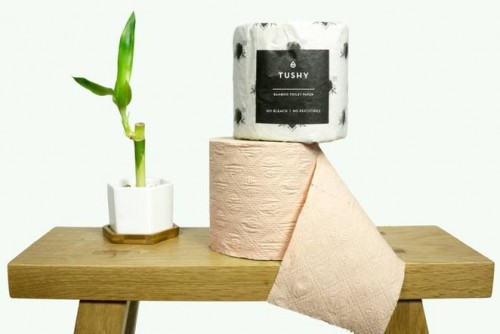RECOMMENDED VIDEOS

Hall Environmental Consultants Nicholasville, KY
Hall Environmental Consultants LLC

Malaysia University of Technology : Innovation and Commercialization…
University Teknology Malaysia, Innovation and Commercialisation Centre (ICC)

TNB Energy Services : Research And Development For Green…
TNB Energy Services Sdn Bhd

G-Energy Global : Energy Efficiency Consultation - Energy…
G-Energy Global Pte Ltd

STeP - Sustainable Textile Production
International Association for Research and Testing in the Field of Textile Ecology (OEKO-TEX)
Related Stories
Bronx community garden transformed with sustainable improvements
The Philippines envisions a green smart city to combat pollution in Manila
Flawed recycling results in dangerous chemicals in black plastic
IE Expo 2018: Asia's Leading Trade Fair for Environmental Technology Solutions
London store recycles 60,000 plastic bottles for 3D-printed interior
13 Jul, 2017

Tushy launches bamboo toilet paper to help you reduce your carbon buttprint
Others | UNITED STATES | 13 Jun, 2017
Published by : Eco Media Asia
In a bid to reduce TP's environmental impact, the team of toilet crusaders behind the Tushy bidet attachment have rolled out an unbleached bamboo alternative.
Tushy, the company that thinks you should treat your butt like your face, believes that toilet paper is wiping away the environment, and has just launched an alternative that it calls a "sustainable poo-solution to Big Toilet Paper consumption."
According to Tushy, 15 million trees and 67 billion gallons of "sh*tty chemicals" (used to bleach the TP) are used for toilet paper each year, and TP production accounts for 15% of deforestation, so switching to a bidet instead of dry toilet paper is a more ecologically sound choice. However, even the most die-hard bidet user still needs a little pat dry, in which case the company proposes the use of its very own bamboo toilet paper, which is completely unbleached and "silky-strong-soft."
I recently received a few rolls of the new Tushy Bamboo TP from the company, and put them into the bathroom in the name of science blogging. The reaction to the new toilet paper by my kids was mixed, to say the least, with the youngest (2 1/2 years) saying he didn't want to use it because it looked "kinda dirty," although to be fair, the toilet paper is only a light tan in color (and if it was the only choice, he'd soon get over it). My two older kids thought it was a little thick, and that the perforations between sheets were a little tougher to tear through, but that it was "very soft." I was rather impressed, as the sheets are really absorbent and strong, while still being at least as soft as any other brand of 'green' toilet paper we've used before, and I appreciate the fact that it's not packaged in plastic. I wasn't convinced that it was as "soft as a baby panda's bottom," but that may be because I've never held a baby panda.
Bamboo toilet paper isn't new, but it really hasn't taken off, perhaps in part due to the perception that it's too expensive, but like most consumer goods, price alone isn't the best metric. It's possible to buy cheap single-ply toilet paper and then have to use twice as much, just as it's possible to make the switch to using a bidet attachment and drastically cut down on the amount of toilet paper used, in which case the cost of the toilet paper per use will drop quite a bit. And when the externalities of the product are taken into account (such as the estimated 37 gallons of water used to make a single roll of TP), the environmental cost is much higher than the 'everyday low price' listed on the shelf.
Tushy sells its bamboo toilet paper for $18 for 12 rolls (which are double rolls of 200 sheets each), or $33 for 36 rolls, and offers a 5% discount for recurring orders, which may seem a little high when compared with the prices for some of the other 'green' toilet papers on the market, but based on our own usage of the Tushy paper, that may not be an accurate comparison. The thickness and absorbency of the Tushy bamboo TP could be responsible for using less of it, which may even out the price discrepancy. According to the company, using a bidet will cut toilet paper use by at least half.
There's a great case to be made for adding a bidet attachment to toilets, which can radically reduce the amount of toilet paper used each day in the home, in turn reducing the amount of trees and water and potentially harmful chemicals used to manufacture that toilet paper. And when coupled with bamboo toilet paper, we may be able to reduce our carbon buttprint significantly. Find out more at Tushy, where the company also sells washable bamboo towels if you want to ditch the TP all together.
Article from treehugger.com
by Derek Markham
